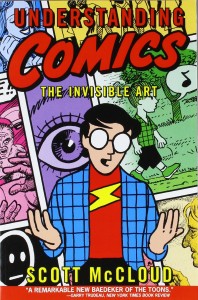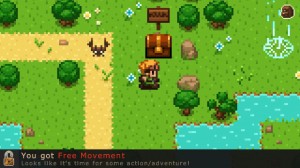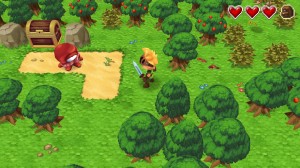Indie Rock: Evoland
- Updated: 9th Apr, 2013
There’s a book I think you’ll like. I don’t care who you are or what you’re into (for the purposes of this recommendation and also as far as my writing process goes you’re a faceless nobody). The book is good and you’ll enjoy it. It’s called “Understanding Comics: The Invisible Art” by Scott McCloud and if we had an Amazon Affiliates account we’d use a link and try to gain a little money through the recommendation, but we don’t [We totally do. UK link. US link. – Ed.] so it’s just a good book you should read. I’ve read it. You can too. I believe in you.
 Whether or not you’re actually interested in comics is pretty unnecessary to getting anything out of the book. Maybe you just like learning new things about stuff you’ve never thought about. Understanding Comics is a fascinating attempt from a creator trying to explain the strengths and history of the method they use to convey narrative. It’s an essay, dissertation even, about what a comic is except it’s also told in the form of a comic. It uses the medium in order to better explain the medium.
Whether or not you’re actually interested in comics is pretty unnecessary to getting anything out of the book. Maybe you just like learning new things about stuff you’ve never thought about. Understanding Comics is a fascinating attempt from a creator trying to explain the strengths and history of the method they use to convey narrative. It’s an essay, dissertation even, about what a comic is except it’s also told in the form of a comic. It uses the medium in order to better explain the medium.
In it, McCloud shares explanations of what the brain does when it views facsimiles of a face or how landscape can be used to inform tone among other possible revelations. It’s an utterly excellent piece of work and if you don’t read it you’re basically choosing the intellectual equivalent of wearing a blindfold forever and patting your head over how smart you’re not being.
I’d wondered for a long while why we don’t have an attempt to do something similar within video games. This isn’t something I just made up so that I can write a column I write every week. I’ve written Twitter Messages about it before. This is legit.
To an extent, Anna Anthropy’s “Rise Of The Videogame Zinesters” (another book we’d like to gain money off you definitely needing to buy at some point in your life but we’ve not figured that out yet [Mat should really talk to his editor before submitting things like this. UK link. US link. – Ed.]) does a great job of discussing the medium’s strengths in producing empathy by making the player responsible for the actions of a character, but it loses a lot in not using the medium itself to explain the medium.
This makes sense, given that Zinesters’ main intention is to be used as a manifesto for people who otherwise would never make (or even enjoy) games learning that their sudden interest is necessary in order to have the culture share more interesting experiences. It’s a little pointless creating a piece of work that says “people who need to be making something aren’t even experiencing the thing at all” and then hiding it in the thing they aren’t experiencing.
We don’t have a game that tries to talk about why games are great. The closest we have is the newly-released Evoland. It’s not as overt as McCloud’s book in that at no point is an author directly addressing the audience, but it’s absolutely a game about games that (to an extent) could already teach people a lot about history and design techniques and feature-creep.
The conceit of Evoland is that it’s a game that keeps adding more features. Initially you start as a gameboy-esque sprite-based character who can only move left, then collects the ability to move right, then up and down, then from one screen to another in a loading-scroll, then graphical quality boosts until you’ve gone from a simple pixelated experiment to a highly defined part-RPG-part-adventure game.
 It’s a love-letter to Final Fantasy and The Legend of Zelda, and it doesn’t intend to be much more. It has some interesting mechanics that actually turn it from an interesting joke to a genuinely compelling game, but by largely choosing to emulate classics without much of a commentary on why it even wants to do that means it misses an opportunity to achieve something much more worthwhile.
It’s a love-letter to Final Fantasy and The Legend of Zelda, and it doesn’t intend to be much more. It has some interesting mechanics that actually turn it from an interesting joke to a genuinely compelling game, but by largely choosing to emulate classics without much of a commentary on why it even wants to do that means it misses an opportunity to achieve something much more worthwhile.
Right now it’s a game that gives you a goofy nostalgic look-back at the journey from Ye Olde Vid Game of Yesteryear and the progression to… I guess games that are even not currently being made at the moment. It’s a shame that it doesn’t do more, but hopefully it inspires something that does.
It’s available on Steam or GOG.com or the Evoland website and it’s probably just the right price, but they sent it over for free so I can’t really say. [I could dock the price from your commission fee if that would help you empathise with your readers? – Ed.]
Oh, Also:
I got a big problem with Dating Sims. As a start, I don’t know that I entirely get the appeal in simulating a relationship with someone in your leisure time when you can literally go out and do the same thing with a real human. Is that the same thing they say about playing Rock Band when you could be playing Guitar? Yes. It’s not an entirely rational response. I’m a hypocrite.
 My biggest issue with Dating Sims is that, key to the design, they suggest a lack of agency from the person you’re pursuing. I’d use a different word there if it were less one-sided, but that’s basically the case. You make an active attempt to gain their interests quicker than they can ignore you or grow to dislike you. You do things for them with the specific intent of making them like you, but you don’t do them because you’re actually the kind of person they’d like.
My biggest issue with Dating Sims is that, key to the design, they suggest a lack of agency from the person you’re pursuing. I’d use a different word there if it were less one-sided, but that’s basically the case. You make an active attempt to gain their interests quicker than they can ignore you or grow to dislike you. You do things for them with the specific intent of making them like you, but you don’t do them because you’re actually the kind of person they’d like.
Kindness Coins is a game (and trust me it is one. If your browser suggests it is a virus you shouldn’t download then call the thing a gosh-darn Dangus and get a better browser immediately) that tries to undermine this trope in games, the thought process that governs them, as well as the extension of this idea into real life.
It’s cool. I like it. It’s very short. Play the video game.

Follow Us!